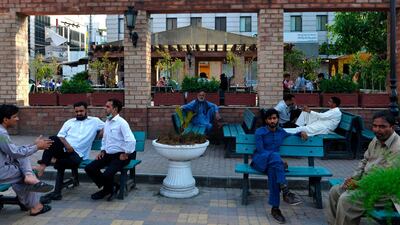Pakistan is bracing for a surge in cases and deaths from its Covid-19 outbreak, as the world’s sixth-most populous country reaps the result of a widespread rejection of lockdown restrictions.
The daily death toll has spiked sharply in the past week and doctors say beds and ventilators needed to treat the worst affected may soon be overwhelmed.
Prime Minister Imran Khan has warned Pakistanis deaths will rise and pleaded with them to abide by distancing precautions, even as he also said the country could not afford to lock down.
“The world has agreed, the richest countries have come to the conclusion that the virus will spread no matter what,” the former cricketer said in a televised address. “Nothing can be done about it. The virus will spread and our death toll will also rise […] I have been telling you that from day one.”
Doctors told The National they expected a rush of cases through the health system in people infected while socialising at the end of Ramadan and over Eid.
“We are worried the number of cases will increase more, and the number of deaths will also increase,” said Dr Qaisar Sajjad, secretary general of the Pakistan Medical Association.
Pakistan shut shops, businesses and schools, and barred movements and gatherings in March to halt the spread of the new coronavirus. But mixed messages, including the reopening of essential businesses and a relaxation on communal prayers at mosques, have since led many to abandon all precautions.
“The preventative measures are not being taken. The opening of the shops and everything before Eid is, I think, very much disturbing,” Dr Sajjad said.
“In the next coming two weeks, because of the incubation period of the disease, and if the appropriate measures are not taken, then everyone should be worried. It will be a big problem.”
Pakistan recorded 78 deaths on Monday, bringing the total to 1,621 and more than 78,000 infections. Official figures are thought to bear little resemblance to the true toll. A random-testing study by Punjab government leaked earlier this week had estimated 670,000 cases in the city of Lahore alone by mid-May. Many people are feared to be dying untested and unrecorded at home.
In Khyber Pakhtunkhwa province, the chairman of the provincial doctors’ association said the easing of restrictions had led to a rise in cases.
“The government has eased down lockdown measures, due to which the province is recording 450 new cases and 20 deaths on average per day from the last few days,” Dr Zubair Zahir said. “If the situation continues, hospitals wouldn’t be able to manage the patients.”
Mr Khan has long argued that his country cannot afford a lockdown and that such measures were feasible only in wealthier nations.
“This coronavirus is not going anywhere and we will have to live with it while striking a balance between poverty and lockdown,” he said.

